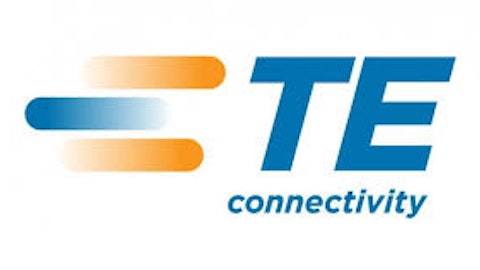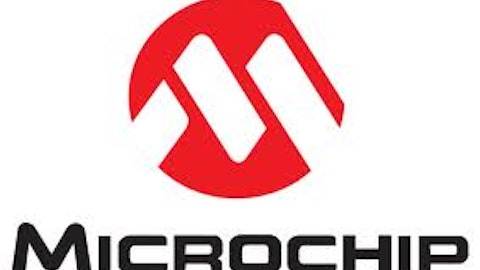Atmel Corporation (NASDAQ:ATML) has been trying to reignite its growth by attempting to ride the success of smartphones, tablets and touch-enabled PCs based on Microsoft‘s Windows 8. The company has been counting on its touch controllers/sensors to expand its core micro-controller business.

Not impressive
Atmel Corporation (NASDAQ:ATML) reported net sales of $347.8 million, which was a 6% decline from last year, marginally beating consensus estimates of $347 million. One of the main reasons for lower revenue was that Samsung’s Galaxy S4 did not sell as well as expected. The other reason was the slow adoption of Windows 8-based systems and devices.
In the tablet segment, Microsoft’s Windows RT has been a failure, and Windows Surface Pro also didn’t move as much as the company would have liked it to. All of these factors have contributed to declining revenue for Atmel Corporation (NASDAQ:ATML).
However, the micro-controller segment grew 7%, which is good because otherwise the results would have been dismal. Also, adjusted earnings went south versus last year from $0.08 per share to $0.06 per share.
Will it get better?
Atmel Corporation (NASDAQ:ATML) is banking largely on the touch controllers/sensors, and it’s optimistic about the growth of Windows 8. This however, so far has been a risky turf as the whole idea of designing an OS with “convergence” in mind hasn’t caused a stir in the market so far. The only positive takeaway is an order win from Lenovo, which so far has been on sidelines as far as touch-enabled PC/notebooks are concerned. If it joins the fray, it could come in as a breather for Atmel as far as its touch controllers/sensors segment is concerned. It has also seen design wins for its maxTouch controller for touch-enabled PCs from Asus and Sony.
Atmel Corporation (NASDAQ:ATML) is looking at revenue between $348 million and $365 million in the third quarter, which at the midpoint is below the consensus estimate of $363 million. So even if it manages to get to the midpoint, it would still report a decline in revenue on a year-over-year basis.
Sales of touch-enabled PC’s haven’t really taken off so far. Some even say that Windows 8 is a failure. This could be a damper for Atmel Corporation (NASDAQ:ATML) and is something that might not go down too well with investors. The company cannot expect miraculous growth in its traditional micro-controllers, as there are other players in the market, like Texas Instruments, Microchip Technology Inc. (NASDAQ:MCHP) plus, reliance on PCs isn’t a good idea these days.
Strong competitors
In the “touch” controllers/sensors segment, Atmel has Synaptics, Incorporated (NASDAQ:SYNA) as competition, and in the micro-controllers segment it has Microchip to contend with.
Synaptics, Incorporated (NASDAQ:SYNA) declared its 4Q 2013 results this month, and its numbers indicate that it’s on a growth path. It beat the Street expectations hands down, posting net income that more than tripled from last year. In the reported quarter, revenue grew 67% to close at $230.2 million, and this beat consensus estimates of $220.8 million. Net income in the reported quarter was $1.29 per share, up from $0.36 per share a year ago.
In order to drive sustainable growth, the company is positioning itself as a leader in the smartphone as well as broader touchscreen markets. It has a strong presence in emerging economies like China. The company is confident of revenue growth from tablets and large touchscreen products, and is equally sure of seeing yet another year of strong annual top-line growth going forward.
Microchip Technology Inc. (NASDAQ:MCHP) recently declared its quarterly results, posting revenue of $462.8 million, up 31% from last year, and beating consensus estimates of $455 million. It also reported record growth in 16/32-bit micro-controllers, with 8-bit controllers just missing record sales. The company is confident that in the coming quarter even-8 bit micro-controllers will break all records in terms of revenue.
The long-term goal of the company is achieving a gross margin of about 60% and an operating profit of about 32.5%. It has a strong track record of paying dividends and has a yield of 3.5%, which makes it an ideal choice for both dividend and growth-seeking investors.
Microchip has a diverse product mix, which reduces the risks of being largely dependent on a given market segment. Its exposure to the volatile mobile market is not as big as Atmel’s, and hence it is better positioned in dealing with market uncertainties.
Conclusion
Atmel has been consistently inconsistent. The mobile-computing market for higher end devices seems to have plateaued, at least for the time being, and this has hurt Atmel as the Galaxy S4 didn’t sell as well as expected. The company’s reliance on Windows PCs is not a welcome sign either. So all in all, Atmel doesn’t look like a stock where you should put your money.
The article This Chipmaker Is Not a Good Investment originally appeared on Fool.com and is written by Amal Singh.
Amal Singh has no position in any stocks mentioned. The Motley Fool has no position in any of the stocks mentioned. Amal is a member of The Motley Fool Blog Network — entries represent the personal opinion of the blogger and are not formally edited.
Copyright © 1995 – 2013 The Motley Fool, LLC. All rights reserved. The Motley Fool has a disclosure policy.




